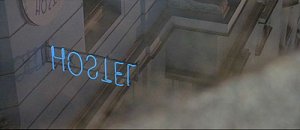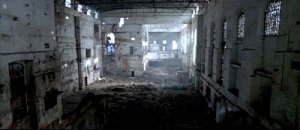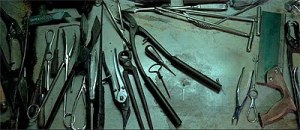Hostel
Wednesday, October 7th, 2009 • Horrorthon Posts / Horrorthon Reviews
This is a very impressive and very interesting movie. It’s quite different from what I had anticipated; it’s cleverer and more sophisticated than its plain, flat presentation suggests. I had certain expectations because of the controversial “gorenography”/”gore porn” labels that got attached to the Hostel and Saw franchises; since I’ve seen three of the Saw movies (and that was just about enough; thank you very much) I figured that Hostel would be more of the same: a thinly-constructed, rudimentary armature for a run of sequences that push the envelope of forcing the audience to witness horrible things being done to the human body.
As with so many movies (and books, and other things) that defy expectations, it’s not that the expectations are entirely wrong; just that they miss the essential truth. Strictly speaking, Hostel is exactly what I wrote above (and what the critics of “gorenography” are so dismissive of and disgusted by): an excuse for graphic depictions of torture. But there’s a great deal more going on here, and that’s why the movie has lingered in my imagination and prompted far more enthusiasm and introspection and unsettling visualization that the Saw movies could ever hope to provoke. Sure, Saw makes a feint toward “meaning” something, in that its “traps” are supposed to have a moral dimension that gets discussed in voice-overs (through that goddamned voice-lowering filter you get so sick of) by Jigsaw, the torture “ringmaster,” but, in the end (as octopunk pointed out in his Saw reviews), that’s all just nonsense; the point is just to hurt the characters and watch them suffer.
Hostel is significantly different in several ways. First, there’s a fairly detailed story that unspools for the entire first half of the movie, with nary a drop of blood in sight. This opening sequence, which is filled with a mounting sense of dread (which the anticipation of the gore to come only sharpens), falls into the classic suspense/horror tradition of Invasion of the Body Snatchers or The Blair Witch Project; the characters are getting into deeper and deeper trouble without really noticing, and as they miss clue after clue (which we delight in picking up around the periphery of the action) the feeling of impending danger is enhanced by the implicit critique of their weaknesses and blindness. It’s classic Greek Tragedy Hubris; the hero enjoys a scenario that seems too good to be true, and, in failing to notice this, suffers the dire consequences of finding out that it is in fact not only “too good to be true” but actually far, far worse than he could ever have imagined.
The premise, and the plot that threads its way through that premise, belongs to a classic horror-movie tradition (exemplified by Halloween) in which the big danger isn’t a supernatural phenomenon, but is, instead, a grotesque exaggeration of human behavior that doesn’t really hold up under daylight scrutiny but is plausible enough to convince the audience through the course of the story. There really couldn’t be a “Michael Meyers” (who just is a psycho killer from the age of six, with no explanation), and, similarly, there couldn’t really be a “Hostel” (or an “Elite Hunting Corp.,” the shadowy and deadly agency that’s the real business behind the quaint Eastern European bed-and-breakfast). But while Halloween’s larger symbolic purpose is simply to address “the boogeyman” in our dreams, Hostel is working on a more sophisticated metaphorical canvas.
This is where Hostel really shines, and for the final forty-five minutes, in which the suspenseful buildup of the first half is more than paid off, the filmmaking shifts into a high gear that far surpasses anything you expect based on the deliberately-staid opening sequences. For the ignorant, arrogant American (and Icelandic) tourists who want nothing from the European continent but a pot-fueled orgy, the Slovakian town that’s their terminal destination (literally) is not just a Hell on Earth but a neo-Orwellian vision of predatory human nature that instantly separates (as they say) the quick from the dead. The sequences inside the slaughterhouse are standard horror-movie fare, to be sure, but the urgency and pathos (and genuine heroism) of those scenes are particularly vivid thanks to the story’s rich political and symbolic overtones. Hostel requires a strong stomach, not just because of the gore, but due also to the pig-like behavior of the protagonists as they’re led to the slaughter (by their libidos and their imperialistic naivite and sense of entitlement). But you can’t really call any of it “gratuitious” (although the movie’s detractors strongly disagree); the symbolic overtones are too rich and too deep, and the movie’s lingering hold on your imagination is a testament to that unusual intelligence and depth.


